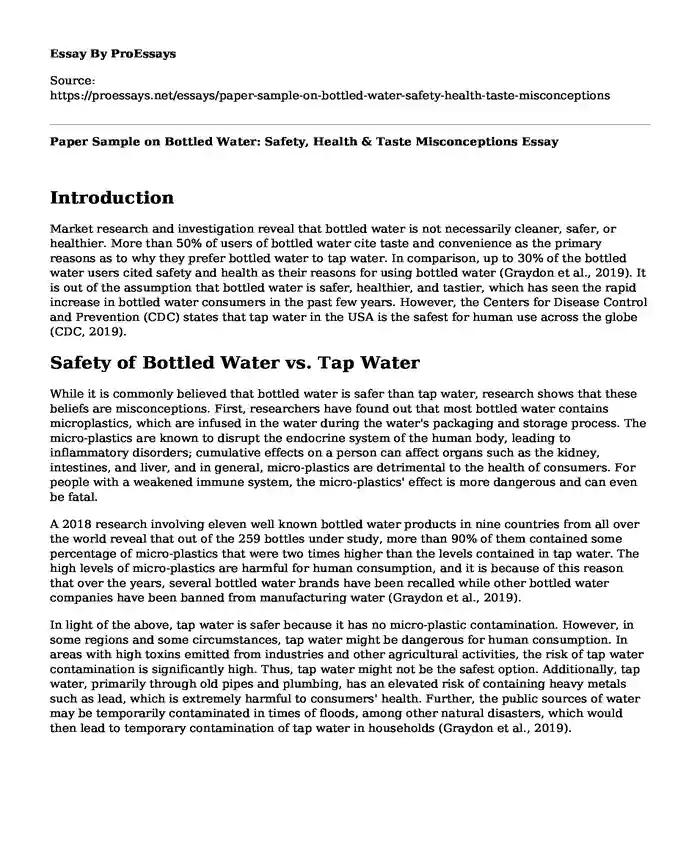Introduction
Market research and investigation reveal that bottled water is not necessarily cleaner, safer, or healthier. More than 50% of users of bottled water cite taste and convenience as the primary reasons as to why they prefer bottled water to tap water. In comparison, up to 30% of the bottled water users cited safety and health as their reasons for using bottled water (Graydon et al., 2019). It is out of the assumption that bottled water is safer, healthier, and tastier, which has seen the rapid increase in bottled water consumers in the past few years. However, the Centers for Disease Control and Prevention (CDC) states that tap water in the USA is the safest for human use across the globe (CDC, 2019).
Safety of Bottled Water vs. Tap Water
While it is commonly believed that bottled water is safer than tap water, research shows that these beliefs are misconceptions. First, researchers have found out that most bottled water contains microplastics, which are infused in the water during the water's packaging and storage process. The micro-plastics are known to disrupt the endocrine system of the human body, leading to inflammatory disorders; cumulative effects on a person can affect organs such as the kidney, intestines, and liver, and in general, micro-plastics are detrimental to the health of consumers. For people with a weakened immune system, the micro-plastics' effect is more dangerous and can even be fatal.
A 2018 research involving eleven well known bottled water products in nine countries from all over the world reveal that out of the 259 bottles under study, more than 90% of them contained some percentage of micro-plastics that were two times higher than the levels contained in tap water. The high levels of micro-plastics are harmful for human consumption, and it is because of this reason that over the years, several bottled water brands have been recalled while other bottled water companies have been banned from manufacturing water (Graydon et al., 2019).
In light of the above, tap water is safer because it has no micro-plastic contamination. However, in some regions and some circumstances, tap water might be dangerous for human consumption. In areas with high toxins emitted from industries and other agricultural activities, the risk of tap water contamination is significantly high. Thus, tap water might not be the safest option. Additionally, tap water, primarily through old pipes and plumbing, has an elevated risk of containing heavy metals such as lead, which is extremely harmful to consumers' health. Further, the public sources of water may be temporarily contaminated in times of floods, among other natural disasters, which would then lead to temporary contamination of tap water in households (Graydon et al., 2019).
Strict Standard of Regulations for Tap Water
The Environmental Protection Agency (EPA) body that is entrusted with the safety of tap water in the USA has more strict standards of tap water regulations compared to The Food and Drug Administration (FDA) body that is entrusted with ensuring the safety of bottled water. The tight regulation policies by the EPA mean that tap water is tested more frequently and is continuously treated and monitored as per the requirements to identify toxins and harmful microbial that might be harmful to the health of the consumers. Moreover, reports and data related to the safety of tap water are always readily available to consumers who can at any time assess the safety of their tap water unlike the reports and containment levels of bottled water which have limited access and thus, consumers are not able to determine the safety of the water (Graydon et al., 2019).
Conclusion
By establishing that bottled water is not necessarily safer than tap water, we will be able to significantly reduce the health effects of micro-plastics that are present in most bottled water, we will also be able to reduce the massive environmental pollution that results from the disposal of the plastic bottles, and most importantly, people will be able to save much more money by using tap water and ditching the expensive bottled water. To increase the safety of tap water, consumers must utilize filters, which significantly helps to eliminate contaminants in water.
References
Centers for Disease Control and Prevention (CDC) (2019). https://www.cdc.gov/healthywater/drinking/public/water_quality.html
Graydon, R. C., Gonzalez, P. A., Laureano-Rosario, A. E., & Pradieu, G. R. (2019). Bottled water versus tap water. International Journal of Sustainability in Higher Education. https://www.emerald.com/insight/content/doi/10.1108/IJSHE-01-2019-0003/full/html
Cite this page
Paper Sample on Bottled Water: Safety, Health & Taste Misconceptions. (2023, Sep 25). Retrieved from https://proessays.net/essays/paper-sample-on-bottled-water-safety-health-taste-misconceptions
If you are the original author of this essay and no longer wish to have it published on the ProEssays website, please click below to request its removal:
- Essay Sample on Roles of the Nurse
- Essay Sample on Moral Principles to Moral Dilemmas in Medicine
- Integrated Change - Essay Sample
- Private Debt Financing: Exceptional Service Grading Company's Options - Essay Sample
- Bariatric Surgery: Benefits and Drawbacks - Research Paper
- Paper Example on IAVs: The Growing Threat of Zoonotic Diseases
- Paper Example on COVID-19: Global Economic Crisis - Millions Infected, Businesses Counting Losses







